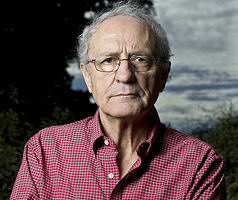Een goede analyse van Israeli Zeev Sternhell, zelf eens het slachtoffer van een rechtse aanslag. In Israël is veel protest tegen de gestegen prijzen van levensmiddelen, tegen de bezuinigingen en de gegroeide armoede onder een flink deel van de bevolking. Maar nooit wordt de link gelegd met al dat staatsgeld dat verdwijnt in de bezetting en de bouw van de nederzettingen. Maar dit zouden mensen eindelijk eens moeten begrijpen: je kunt niet links zijn voor jezelf en rechts voor de Palestijnen, je kunt geen rechtvaardigheid voor jezelf opeisen en dat tegelijk onthouden aan de anderen. Wie niet èn tegen de armoede èn tegen de bezetting protesteert eindigt in rechts.
“Left” is not only a political category. It’s first and foremost a moral category, and morality is not divisible. In that sense we have to look not only at the domination of the poor by the rich, but also at the domination of the Palestinians by the Israelis. The universal right to freedom and equality is also indivisible: Israelis cannot demand justice for themselves and deny it to others. A Palestinian state will be established on the same basis as that on which Israel exists: The right to freedom and self determination. That is why the left’s rejection of the settlements does not stem only from economic considerations and as a means for achieving peace, it also stems from respecting the Palestinians’ right to equality and justice. That is the real watershed separating the left and the right, and no political acrobatics can change it.
Lees het hele artikel, dat vandaag verscheen in Haaretz.
Meer over en van Sternhell, hier en hier

(Sternhell)
The trap of being apolitical
“Anyone who refuses to define himself as ‘left’ and to fight against poverty and the occupation, will end up on the right”
We have to be grateful to Yair Lapid for his contribution to Israeli politics. Only rarely does a politician rid himself so quickly of his empty campaign slogans and admit the truth openly. And the truth is that there are two aspects to the Israeli situation: On the one hand there is crude exploitation of workers, and in effect there is an asymmetrical class war in which the tycoons and the upper middle class, which control the economy, regularly erode the living conditions and ability to survive of the weaker classes, and deliberately cause many of them and their children to live below the poverty line.
The battle is asymmetrical because the weaker elements are not organized, don’t have trade unions and are unable to threaten the centers of power. If they were all employees of the Israel Electric Corporation they would not be helplessly facing the upper middle class, which is marvelously organized in a close- knit network in which the economic and political leaders rely on one another. In compensation the victims receive ultranationalist fervor, the principle of Jewish superiority, hatred of Arabs and Haredim, and the sense of always living on the brink of war, a situation that requires unity and the closing of ranks. In this perception fear is a methodical need, and it is nurtured consistently and determinedly.
The second aspect, and here again Lapid provided the laboratory evidence, is the fact that in essence the right is one: The proponents of neoliberal economics – Lapid himself, Naftali Bennett and Benjamin Netanyahu – are also the ones who are carrying the settlements on their shoulders and denying that we are capable of achieving a fair arrangement with the Palestinians. The ultranationalist legislation in the Knesset, which is about to reach the agenda once again with the help of the Finance Minister’s lackeys, was designed to subordinate the political-legal concept of Israeli citizenship to ethnic Jewish identity, whatever that means.
This will exacerbate tensions in relations with the “Zuabis” and the Palestinians even further. Maintaining these relations on the verge of an explosion without reaching the conflagration itself is an art that the Israeli government has long since mastered, and its entire long-term policy is also based on it.
One of the causes of the present situation is the trap of being apolitical, into which the social protest of the past two years fell. This gave rise both to the demagoguery of Yesh Atid and the hatred of the left created by Labor. But perhaps the time for sobriety has finally arrived, and the young mothers pushing their baby carriages at demonstrations on Saturday nights will understand that there’s no such thing as a “political right and a social welfare left.” We must grab the bull by its horns, because the right is one unit and so is the left, and anyone who refuses to define himself as left and to organize all the workers to fight against poverty and exploitation as well as against the occupation, will end up on the right.
“Left” is not only a political category. It’s first and foremost a moral category, and morality is not divisible. In that sense we have to look not only at the domination of the poor by the rich, but also at the domination of the Palestinians by the Israelis. The universal right to freedom and equality is also indivisible: Israelis cannot demand justice for themselves and deny it to others. A Palestinian state will be established on the same basis as that on which Israel exists: The right to freedom and self determination. That is why the left’s rejection of the settlements does not stem only from economic considerations and as a means for achieving peace, it also stems from respecting the Palestinians’ right to equality and justice. That is the real watershed separating the left and the right, and no political acrobatics can change it.
